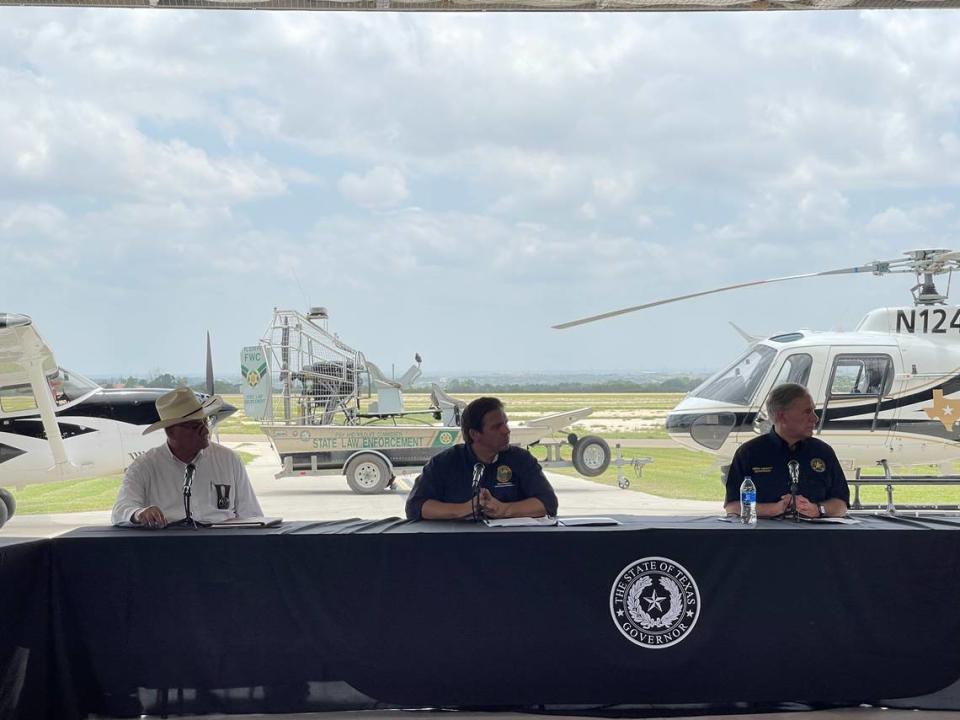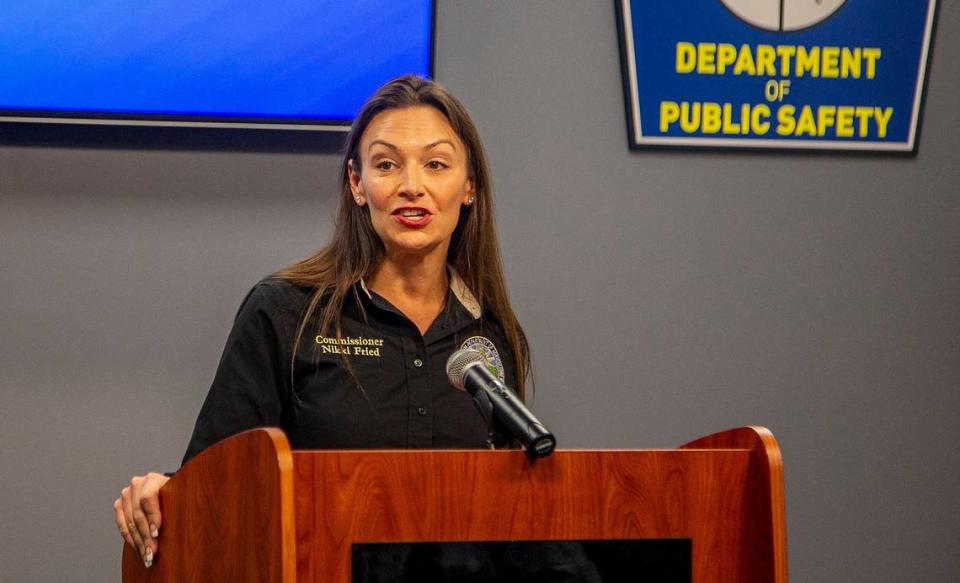Is Ron DeSantis governing, campaigning or both? That depends on whom you ask
Gov. Ron DeSantis has a stable of taxpayer-paid staff that works to arrange logistics, security and messaging for his events, and just in the last month that has included: A mission to the U.S.-Mexico border in Texas, a prime-time Fox News Town Hall on Cuban relations, and a closed-door discussion on mask wearing that his “official” political team used in a fundraising email.
For DeSantis, who has not officially announced his reelection bid, the official events highlight the fine line he walks between governing and campaigning. His official state business is increasingly being promoted and used for fundraisers by his independent political action committee, taking advantage of narrow state laws that separate coordination between campaigns and outside groups.
Florida has laws that restrict state employees from taking “any active part in a political campaign while on duty.” But there is nothing expressly authorizing or forbidding coordinated events between a candidate and an independent political action committee, as long as they abide by certain restrictions including travel reimbursements when an official trip coincides with a political function.
“Even for the coordination restrictions that are in place, it’s often difficult to enforce those restrictions, because a lot of these kinds of exchanges are happening with sort of a wink and a nod,” said Austin Graham, legal counsel at the Campaign Legal Center, a watchdog group based in Washington, D.C.
An event that has underscored how the governor can blur the line between state business and political activity is a trip he took to the U.S.-Mexico border in mid-July, as border politics gained renewed mainstream attention.
DeSantis flew to Del Rio, Texas, on the state plane to co-host a press conference with Texas Gov. Greg Abbott. At the press event, both Republican governors criticized President Joe Biden’s border policies and touted DeSantis’ decision to send more than 50 state law enforcement officers to help Texas secure the U.S. border. Florida taxpayers are paying for the month-long mission, whose total cost has not yet been tallied by state officials.

A couple of hours before the start of the press conference, DeSantis’ affiliated political action committee, Friends of Ron DeSantis, used the official event as a fundraising pitch.
“Today, I am heading to Texas for a firsthand look at the raging crisis on our country’s southern border,” the fundraising email said, noting that DeSantis was “the first governor to send resources” to the U.S.-Mexico border after Abbott asked other governors for help.
More than 2,000 donations poured in that weekend, the vast majority were small-dollar donations given online through fundraising efforts like the email DeSantis’ political arm sent out, according to campaign finance reports.
The mission at the U.S.-Mexico border has been deemed state business because it was in response to an official request by Abbott under the Emergency Management Assistance Compact, and because “the border crisis directly affects taxpayers of Florida,” said Christina Pushaw, the governor’s press secretary.
“It would not be appropriate to classify these types of deployments as political activities, because the nature of EMAC is intergovernmental and involves official contact between two state governments,” Pushaw said.
Ron Meyer, a Tallahassee-based Democratic campaign finance and elections attorney, said that because there is arguably some component of state business, it may be allowed under state law.
“It’s always painful to watch what is perhaps technically allowed, but nonetheless, a misuse of state resources for political purposes,” Meyer said. “You can’t dress it up. It’s wrong, but the question of whether it is illegal — that’s where you get into the gray area.”
Nationalizing a future candidacy
Much of DeSantis’ state-level policy priorities center on themes that have a national appeal to Republican voters, who, according to early polls, have quickly anointed him as a leading contender for president in 2024.
Since taking office, DeSantis has piggy-backed on many national issues, a sample of which includes banning so-called sanctuary cities, fighting calls to “defund the police,” barring the academic concept of “Critical Race Theory” in K-12 schools, and making changes to the state’s voting system after President Donald Trump lost the 2020 election.
“There’s a trend of the nationalization of state elections, where we are seeing increasing contributions from out of state to candidates across the country, for state office,” said Pete Quist, the deputy research director of OpenSecrets, which tracks state and federal political contributions. “It increases the profile that you have for potential donors.”
Even though DeSantis is not an officially declared candidate in the 2022 governor’s race, he has spent a portion of the summer aggressively fundraising in Southern California, Nevada, New Hampshire and just last week, in Wisconsin. Those out-of-state fundraisers — which are common for politicians seeking a higher-office — have helped his political committee build a treasure chest with about $44 million on hand as of late June, according to campaign finance reports.
Florida law sets a $3,000 contribution limit to candidates for statewide office, but there is no limitation to the amount a political action committee can receive or spend.
DeSantis’ affiliated political committee has had multimillion-dollar monthly contribution hauls since February. In July, the political committee brought in an additional fundraising consulting firm and acquired an email address list from Ben Shapiro’s The Daily Wire, one of America’s fastest-growing conservative media companies, for $3,000 as a means to expand its fundraising operations, according to campaign finance reports and committee treasurer Nancy Watkins.
Keeping the cash flowing into the political action committee could be a reason why DeSantis has not yet officially announced his bid for reelection, Quist said.
“It’s really unusual for candidates to be raising large sums of money without forming a candidate campaign committee. In many states, in fact, you form a candidate campaign committee and it just stays active as long as you’re in office,” Quist said.
‘Egregiously political things’
DeSantis’ handling of the pandemic has elevated his national profile, more so as he attacks Biden and Anthony Fauci, the nation’s top infectious disease expert. DeSantis’ political team, for example, is selling “Don’t Fauci My Florida” drink koozies and T-shirts and regularly sends out fundraising emails attacking Fauci’s “lockdown policies.”
In response, Fauci has said DeSantis is “doing egregiously political things” as part of his response to the pandemic in Florida, where this week there’s been record-breaking COVID-19 hospitalizations.
“I don’t want to get into a tit-for-tat with DeSantis. I don’t want to go down to his level. He’s doing egregiously political things, having T-shirts that say ‘Don’t Fauci my Florida,’ selling beer mugs with derogatory statements about me — raising political money by trying to discredit me. So I don’t want to get into the mud with him,” Fauci said during a Wednesday interview with McClatchy.

Meanwhile, DeSantis’ political team is bragging that the anti-Fauci merchandise is “FLYING off the shelves, with orders coming in from coast to coast!”
DeSantis’ political arm is also fundraising off of his feud with the White House over mask mandates in schools. On Tuesday, Biden delivered a stern message to governors like DeSantis who are pushing back against mask mandates in schools: “Get out of the way.”
A day later, the governor held an official press conference in Panama City to talk about Hurricane Michael recovery efforts. But what got the most attention was his response to Biden, who he accused of “helping facilitate” COVID-19 by not securing the border with Mexico.
“Why don’t you get this border secure?” DeSantis said. “Until you do that, I don’t want to hear a blip about COVID from you.”
A few hours later, his political team sent out a fundraising email using the governor’s statements almost verbatim.
“Until Joe Biden gets the border secured and this crisis under control, I do not want to hear a blip about COVID from him or his administration,” the fundraising email said.
Rivaling media blitz
DeSantis — like his Democratic rival in the 2022 governor’s race, Agriculture Commissioner Nikki Fried — is drawing attention to his agenda and official events by appearing on their preferred cable news outlets.
Fried regularly appears on MSNBC to attack the governor’s response to the pandemic in Florida while DeSantis prefers Fox News and One America News to talk about how great of a job he is doing.
“They’re going on cable because the cable that they’re picking, it appeals to the largest portion of their base, and they are trying to lock in their base right now,” said Susan MacManus, a retired political science professor who taught at the University of South Florida.
In recent weeks, Fried has been criticized and accused by the Republican Governors Association of using state resources for her media blitz. Her state-funded office, for example, organized a press event to talk about Florida’s COVID-19 numbers and her campaign’s Twitter account later distributed video of the official event. Also, in a recent MSNBC interview, Fried wore her agency’s uniform while talking about her bid for governor.

“You know, I am running to be the governor of the state of Florida. But I never expected to start the job now. I expected to start in 2023, but we are doing the governor’s job for him because he is absent from our state and leaving the people of Florida out here very vulnerable,” Fried said during a nationally televised interview on Tuesday afternoon.
“Commissioner Fried often uses her state office for activities that resemble political campaigning and seem primarily aimed at increasing her name recognition rather than serving Floridians,” Pushaw said in an email last week.
DeSantis has deployed a similar strategy.
In May, DeSantis signed into law changes to the state’s voting system during a nationally televised Fox News event hosted by a fan club of Trump’s. When the state’s vaccine rollout was in full swing, DeSantis took ample air time on Fox News to fight critics amid news reports that political optics played a role in the state’s vaccine distribution plan in a Republican-rich neighborhood.
In July, the governor’s staff took video of a closed-door roundtable discussion on mask wearing that was uploaded on the conservative video platform Rumble and then, on the governor’s Twitter account. The video was then used in a fundraising email by the political team.
A few days earlier, DeSantis was a featured guest at a GOP town hall hosted by Fox News’ prime-time host Sean Hannity. The event was broadcast live from Versailles Restaurant in Miami’s Little Havana against a backdrop of Cuban flags and “TRUMP WON” banners.
The town hall was considered an official event because supporting the people of Cuba in their “fight for freedom from the communist regime is not political in nature” and because Hannity focused on DeSantis’ calling on President Biden to help the Cuban people, Pushaw said. She added the governor had sent a letter “with official letterhead” to the White House in an effort to get internet connection to residents in Cuba.”
“It would not have made sense for the Republican Party of Florida or a political committee/PAC to send such a request to the White House,” Pushaw said.
But some of the governor’s critics view the media attention as a strategy, too.
“I think he is not just messaging to Floridians but to potential voters in the next presidential election,” said Ben Wilcox, the executive director at Common Cause Florida, an organization that has legally challenged some of the governor’s legislative priorities.
MacManus, however, says this happens every year.
“As I say often, between now and Election Day, everything that any elected official running for office does is going to be perceived as political. It will all be perceived as candidates positioning themselves,” she said. “The theory of relativity is very much at work here.”
McClatchy Washington Bureau reporter Michael Wilner contributed to this report.
This story was updated to correct the information about retired University of South Florida political science professor Susan MacManus.

 Yahoo Finance
Yahoo Finance 